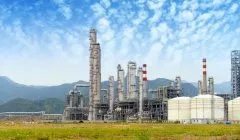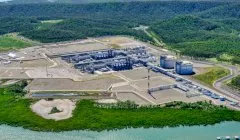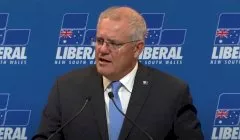Invest
Joining the buyers club: How to build a hefty passive income in your 20s or 70s?
Invest
Joining the buyers club: How to build a hefty passive income in your 20s or 70s?
“2021 is going to be the year of low stock levels, low interest rates, increased confidence and the chase for yield as people look to replace their incomes.”
Joining the buyers club: How to build a hefty passive income in your 20s or 70s?
“2021 is going to be the year of low stock levels, low interest rates, increased confidence and the chase for yield as people look to replace their incomes.”

Professional property investor Scott O’Neill believes that prospective property investors have a lot to look forward to in 2021.
In a recent chat with Smart Property Investment, Mr O’Neill, the founder and director of Rethink Investing, shared his thoughts on the year that was, the year that’s before us, and how best to secure a steady passive income portfolio whether you’re 20 or 70.
While 2020 did not shape up quite as expected, the doom-and-gloom property forecasts have remained just words on paper, but moving into 2021, how do you expect the market to move amid possibly increased uncertainty and the predicted March economic cliff?
For the commercial markets, 2020 was actually a very good year overall from an asset appreciation point of view. Of course, there were some exceptions to this such as CBD office space, and some retail assets didn’t perform well. This was due to COVID-19 closures and restrictions. But of other types of properties, this was actually one of the best years we have seen for increased buyer demand for quality tenant investments.

Why? It’s because, more than ever, people value high yield and security of tenant. Many commercial tenants offer more security than residential as well. For example, strong logistics companies, medical professional and even some office tenants such as accountants, solicitors and government tenants all did well in 2020. Also, anything related to “essential services” was the go-to for many investors looking to boost their passive incomes.
Trends to expect to see in 2021 – higher demand for quality assets. Particularly in industrial assets as many more investors see the benefits of the e-commerce boom, the need to logistics and storage. These trends have been around for a few years, but expect these trends to continue into 2021 at an even faster rate as consumer confidence hits seven-year highs.
2021 is going to be the year of low stock levels, low interest rates, increased confidence and the chase for yield as people look to replace their incomes. Exciting times!
Given everything 2020 has thrown at Aussies, I think many are looking to branch out and begin to build or expand their passive income portfolios. How do you suggest people approach this in a climate that, although not too turbulent, is certainly not ideal?
The key is to understand the market and the investments you’re looking at from an expert’s point of view. If this is the first time you have considered commercial property, I highly recommend seeking professional help from a buyer’s agent who is an expert in commercial property (not residential). If you go into this complex field without doing enough homework, you can get burnt. But when you get it right, it will be more lucrative than residential property. Especially from a cash flow sense.
Your motto is, “No matter your age or your current position in life, it’s never too late to start building wealth through property investing”. Is this really the case?
Yes, we have clients as young as 20 years old all the way up to the late 70s. In fact, about one in 25 of our clients is over 70 years old. Proving it’s never too late to build yourself a passive income in property. Commercial property in particularly favours people who have less time to wait for capital growth.
Most people when they hit 30 start to yearn for an early retirement, and most dream of an enviable passive income stream, but is this actually achievable and how?
Yes, it is. However, you need an income from your day job to fuel your investment portfolio. The more you earn, the faster you can progress into a “retirement grade” property portfolio. For some, it might take 10 years; others, it might be over 30 years.
If you stick to a plan of buying good quality higher-yielding assets that also benefit from capital growth, over the long run you will come up on top. This is why property investing is Australia’s number one source of early retirees.
About the author

About the author


Commodity
Gold's remarkable surge in 2025 sets the stage for a volatile 2026
Gold has experienced a stellar year in 2025, achieving over 50 all-time highs and delivering a return exceeding 60%, making it one of the top-performing assets. This impressive performance has been ...Read more

Commodity
Scenic Eclipse launches fifth Antarctica season with new submersible, private jet transfers and helicopter experiences
Scenic Discovery Yachts has commenced its fifth Antarctica season, introducing new ultra-luxury experiences including private jet transfers, advanced helicopter excursions and a new Scenic Neptune ...Read more

Commodity
Is crypto getting the shaft for a big gold re-polish?
While the spotlight shines on trendy cryptocurrencies, investors evidently haven’t lost interest in traditional and tangible commodities like precious metals. Read more

Commodity
Morrison’s gas-led recovery sees manufacturers ‘held to ransom’ by gas cartel
Australia’s manufacturing sector and its workers are being ‘held to ransom’ by the gas cartel, despite the Morrison government promising cheap gas as a key policy in the COVID-19 recovery planRead more

Commodity
‘Investors should take note’: Gas-led recovery to lead to stranded assets
Australia’s gas-led economic recovery could be relying on inaccurate financial assumptions, new research has revealed. Read more

Commodity
Credibility up in flames as government opens 21 new gas and oil exploration sites
Climate groups are saying the Morrison government lacks any credibility when it comes to climate change after it announced 21 new gas and oil exploration areas. Read more

Commodity
Morrison urged to drop gas-led recovery after new global warning
The International Energy Agency has found that countries like Australia need to transition their energy grid within 14 years to reach net zero, defying Prime Minister Scott Morrison’s gas-led economic ...Read more

Commodity
Taxpayers to bear brunt of Morrison’s $2bn pledge to oil refineries
Taxpayers are set to be on the hook for up to $2 billion over the next decade as the government commits to protecting two oil refineries. Read more

Commodity
Gold's remarkable surge in 2025 sets the stage for a volatile 2026
Gold has experienced a stellar year in 2025, achieving over 50 all-time highs and delivering a return exceeding 60%, making it one of the top-performing assets. This impressive performance has been ...Read more

Commodity
Scenic Eclipse launches fifth Antarctica season with new submersible, private jet transfers and helicopter experiences
Scenic Discovery Yachts has commenced its fifth Antarctica season, introducing new ultra-luxury experiences including private jet transfers, advanced helicopter excursions and a new Scenic Neptune ...Read more

Commodity
Is crypto getting the shaft for a big gold re-polish?
While the spotlight shines on trendy cryptocurrencies, investors evidently haven’t lost interest in traditional and tangible commodities like precious metals. Read more

Commodity
Morrison’s gas-led recovery sees manufacturers ‘held to ransom’ by gas cartel
Australia’s manufacturing sector and its workers are being ‘held to ransom’ by the gas cartel, despite the Morrison government promising cheap gas as a key policy in the COVID-19 recovery planRead more

Commodity
‘Investors should take note’: Gas-led recovery to lead to stranded assets
Australia’s gas-led economic recovery could be relying on inaccurate financial assumptions, new research has revealed. Read more

Commodity
Credibility up in flames as government opens 21 new gas and oil exploration sites
Climate groups are saying the Morrison government lacks any credibility when it comes to climate change after it announced 21 new gas and oil exploration areas. Read more

Commodity
Morrison urged to drop gas-led recovery after new global warning
The International Energy Agency has found that countries like Australia need to transition their energy grid within 14 years to reach net zero, defying Prime Minister Scott Morrison’s gas-led economic ...Read more

Commodity
Taxpayers to bear brunt of Morrison’s $2bn pledge to oil refineries
Taxpayers are set to be on the hook for up to $2 billion over the next decade as the government commits to protecting two oil refineries. Read more









